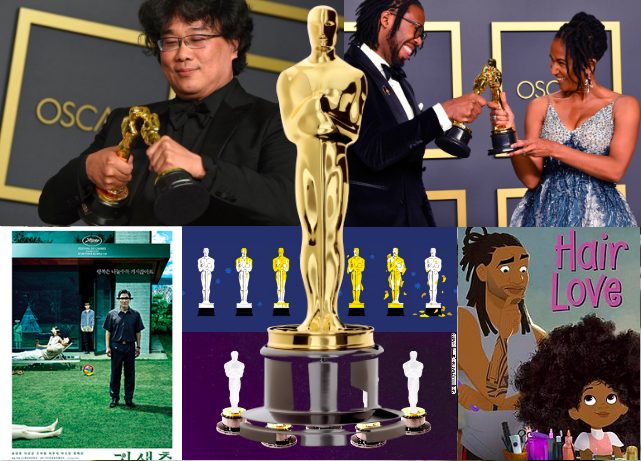Is Hollywood More Diverse?
February 19, 2020
“And the Oscar goes to… Parasite.”
As Jane Fonda said these six words, shockwaves were sent not only through Hollywood, but all across the globe.
“Parasite” set multiple precedents throughout the night. The film is the first non-English speaking language film to win Best Picture in the Oscar’s 92 years. It also took home awards for Directing, International Feature Film and Writing (Original Screenplay). Writer, Director and Producer Bong Joon Ho won all three of the categories he was nominated for. In addition, “Parasite” was also the first film from South Korea to be nominated for, and subsequently win, International Feature Film.
Since a decade Korean films have been creating waves internationally & the biggest recognition hits today with #Parasite winning 4 #Oscars !!!#Oscar2020 pic.twitter.com/S8QUy2OnEM
— Rakesh Gowthaman (@VettriTheatres) February 10, 2020
Parasite’s success shows how rarely foreign films are recognized in Hollywood. The International Film category, formerly known as Foreign Language Film, limits non-English speaking submissions to just one entry per country. With this major win for international film, people think that foreign films will be more represented in following years’ nominations.
“Once you overcome the one-inch tall barrier of subtitles, you will be introduced to so many more amazing films,” says Joon Ho in his acceptance speech.
With the precedent that “Parasite” set, is this a sign of not only Asian representation in Hollywood, but more diversity as a whole?
People began to recognize the lack of diversity in Hollywood back in 2015, when all nominated in the acting categories were white. When this happened again in 2016, the hashtag #oscarssowhite started trending on Twitter.
Shame takes centre stage at #Oscars: https://t.co/8eCHt02zJF pic.twitter.com/SHRXrjYBQm
— Peter Howell (@peterhowellfilm) February 29, 2016
For weeks the Academy was subject to harsh criticism, being called racist and ignorant.
“I think that the #oscarssowhite hashtag was needed for people to realize white-washed the Oscars have become in recent years. People look to the Oscars as what’s big in Hollywood, and not representing other ethnicities or cultures closes them off to a whole other range of film,” says Mary Grace Nash (’23).
Following the backlash, people began to take more notice of the lack of diversity in not only nominations, but in Hollywood as a whole. For over five years, UCLA has conducted an annual Hollywood Diversity Report. The report goes into detail about the diversity in Hollywood, divided by careers, including actors, directing, production, and more. This past year, only 30% of Hollywood’s top actors were people of color. In 2018, 80.7% of Hollywood’s top directors were white. In 2019, it was 85.6%.
The report also covers lack of gender diversity. Women make up 44% of lead actors, and just 15% of top directors in Hollywood.
While these numbers are vastly improved compared to prior years, there are still major changes needed to be made. This year, minorities were not well represented in the 2020 Oscar nominations. People were especially disappointed with the lack of diversity in the acting categories. Cynthia Ervo was the only black nominee of any acting category, both male and female, leading and supporting.
“It is bittersweet, really, because while I worked very hard for what was happening, I also would have loved to be able to celebrate with other people of color who worked really hard this year. I believe there has been incredible work this year and beautiful pieces that have come out not just by people of color but women directors as well. So I’m hoping that I can represent us well once that celebration happens,” says Ervo to the L.A Times.
In addition, many people this year were upset about the lack of female representation, specifically in the category of Best Director. Natalie Portman has always been vocal about the lack of female representation; most notably when she presented the nominees for Best Director in 2018, saying, “And the all male nominees are…”.
This year she protested the lack of gender diversity through her fashion. Portman wore a cape with the names of snubbed female directors on the border.
The names of the women behind some of the best films of 2020 were stitched into the lapel of Natalie Portman’s @Dior cape at the #Oscars https://t.co/grogjrWLdi pic.twitter.com/lQNaRHM7HR
— British Vogue (@BritishVogue) February 10, 2020
“Parasite” was not the only winner to set precedent. Short film “Hair Love” , the story of a black family in which the dad struggles to learn how to do his daughter’s hair, took home Best Short Film. The short, funded with a Kickstarter, sparked conversation about the importance of hair in the black community.
“I saw “Hair Love” about two months ago. It’s not only an amazing film, but also that the fact that it recognizes people of color and the struggles of having African American hair is incredible. A lot, if not all young African American girls can relate to the girl in the short film because that’s how it is at a young age, you have to figure out how to tame your hair,” says Tress Jacobs (’20).
Films such as “Parasite “and “Hair Love” have opened the gates of representation for minorities. However, there is work to be done. Hollywood is still primarily white, but films such as these are paving the way for future representation and diversity. People hope that in the coming Academy Awards, more minorities are given the platform and the recognition they deserve. In addition, people hope to see more diversity in Hollywood as a whole, such as more female directors. Hollywood still has a long way to go, but its steps like these that end the norm of seeing one race take over the big screen.


Sydney Wills • Feb 20, 2020 at 10:18 am
awesome article I loved this!